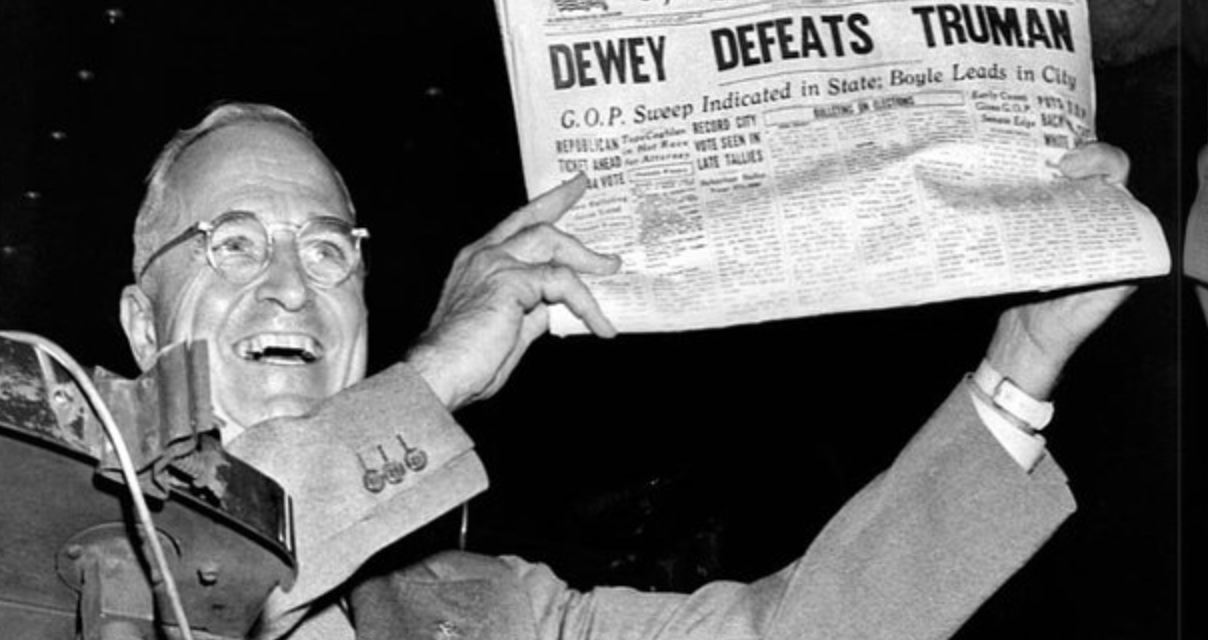Back in the summer of 1948, President Harry Truman’s reelection prospects looked bleak.
Only having assumed the presidency less than four year earlier in the wake of President Franklin Delano Roosevelt’s death at the beginning of his unprecedented fourth term in April of 1945, the former Missouri senator was expected by many pundits to lose to Republican nominee Thomas Dewey – New York’s governor.
Chief among Truman’s reelection obstacles were disagreements within his own party, clashes so profound that two members of it decided to run against him in November. Henry Wallace, Truman’s former secretary of commerce who had sparred with the president over the administration’s hardline approach to the Soviet Union, was challenging his old boss on the Progressive Party ticket. Upset over President Truman’s support of a civil rights bill, Mississippi Governor Strom Thurmond decided to challenge the president as a “Dixiecrat” with the State’s Rights Party.
Third-party presidential candidates routinely serve as spoilers, pulling support from their former party that’s nowhere near enough to win – but plenty enough to hand the election to the opposing major party candidate.
Approaching the 1948 election, party loyalists urged President Truman to pull back from his support of the civil rights movement, citing the potential for a party split and reelection loss. He refused, suggesting that if he were to lose because of his support of civil rights, it would be a noble reason. In fact, in an address to a joint session of Congress, the president declared:
We believe that all men are created equal and that they have the right to equal justice under law.
We believe that all men have the right to freedom of thought and of expression and the right to worship as they please.
We believe that all men are entitled to equal opportunities for jobs, for homes, for good health and for education.
We believe that all men should have a voice in their government and that government should protect, not usurp, the rights of the people.
These are the basic civil rights which are the source and the support of our democracy.
We cannot be satisfied until all our people have equal opportunities for jobs, for homes, for education, for health, and for political expression, and until all our people have equal protection under the law.
He concluded his speech by saying:
If we wish to inspire the peoples of the world whose freedom is in jeopardy, if we wish to restore hope to those who have already lost their civil liberties, if we wish to fulfill the promise that is ours, we must correct the remaining imperfections in our practice of democracy. We know the way. We need only the will.
Despite the objections from within his own party, Truman would go on to win reelection.
Now four months removed from the reversal of Roe, there are some similar sounding voices within the conservative lobby urging politicians to pull back from their support for the pre-born. There have been reports that some politicians have even updated their website to remove references to their pro-life platforms.
Protection and defense of the preborn should not be seen as a political issue. It’s a moral one – and when it comes to preserving and protecting innocent life, political calculations should play no part.
Now is not the time to pull back, ease up or play down our pro-life convictions. There are mothers, fathers and children hanging in the balance, needing our assistance, encouragement and advocacy. It’s a matter of life and death.
And like Truman discovered, the prevailing political narratives are often wrong. Be skeptical of claims that a pro-abortion backlash is brewing in America. As Christians, we must continue to pray and work towards a post Roe-America that lifts up and champions life – and when we do, we will find many willing and able allies eager to join in the effort.
That’s because when it comes to protecting pre-born life, to quote Harry Truman:
We know the way. We need only the will.






